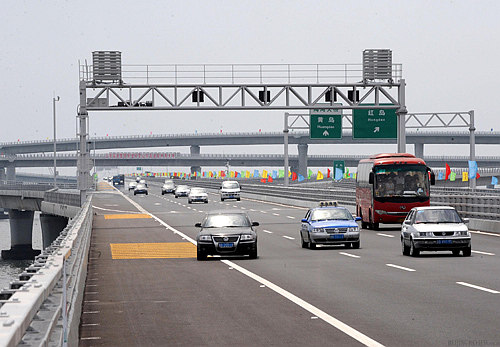|
 |
|
CONSTRUCTION QUESTIONS: Motor vehicles on the Qingdao Jiaozhou Bay Bridge on July 5 as remaining work on the newly built bridge goes on (XINHUA) |
Train Malfunctions
The opening of the Beijing-Shanghai High-Speed Railway has been a source of great excitement for Chinese people. Citizens have high expectations of safety, comfort and environmental protection on this railway. However, since formal operations began on June 30, a series of accidents have taken place.
A breakdown occurred on July 10 at the contact network of the Qufu-Tengzhou-Zaozhuang section due to stormy weather, which prevented 19 trains from arriving on time. Two days later, on the afternoon of July 12, due to a malfunction in power supply facilities, some trains were delayed again.
China's high-speed rail link is now the longest in the world, but high speed on the line is not enough. There are still a lot of problems waiting to be solved. Is the railway able to cope with emergencies related to extreme weather and can it ensure the safety of its technical equipment? Does the train staff know how to comfort and compensate passengers when accidents occur?
It seems that the service, security and managerial work of our high-speed trains is falling behind speed. How to develop the railway into a comfortable and safe manner is a matter of urgency facing China's advanced high-speed railway.
People's Daily
Plastic Bags
Six ministries including the National Development and Reform Commission recently announced a nationwide campaign to forbid supermarkets and various other retailers from providing free plastic shopping bags during July and August. Retailers who violate the regulation will be punished.
Since the Chinese Government began to adopt bans on the free use of plastic bags in 2007, supermarkets have already ceased to offer free plastic bags to consumers. But, in daily life, plastic bags are still widely used, particularly in farm produce markets.
But, when the charge on a bag is listed as an extra item, consumers will be affected to some extent. The primary goal of the ban is to help rid the country of the pollution caused by these bags.
The reality now is, even if a plastic bag adds to the cost of consumers, they are unable to eradicate the deep-rooted habit of using plastic bags. The major reason is for most people the fee on plastic bags is not high enough to prevent them from using them.
The use of plastic supermarket bags is strongly opposed by people around the world, and more and more countries have officially announced bans on the use of plastic bags. However, the ban is only a temporary measure, and the solution is to develop biodegradable, convenient substitutes for plastic bags. Only when shoppers are really willing to give up plastic bags will an environmentally friendly life habit form.
Yanzhao Evening News
Cooking Oil
Beijing Municipal Health Bureau recently said the bureau will carry out a tough action against the use of bad cooking oil in the city's restaurants.
This action may help to some extent, but removing bad cooking oil from restaurants' tables is not enough. These kinds of oil can be used as bio-fuel and chemical products, or in other fields.
The bad oil is harmful to human health, while when it is used in other areas, it is still useful. Turning waste kitchen oil into jet fuel is costly, so it may not be a good choice in China, but it is realistic to transform waste oil into bio-diesel. In east China's Jiangsu and Zhejiang provinces, several companies now produce bio-diesel and chemical products in daily use, such as unsaturated fatty acids.
It's a pity we still lack incentive policies for this business, and also a standard for bio-diesel. Because of this underdeveloped bio-diesel market, businesses devoted to the safe use of waste oil can't develop strongly.
If there is strong policy support, processing bad oil to be useful products like bio-diesel could become a lucrative business. Then, who would ever like to risk using bad oil as cooking oil on restaurant tables?
The Beijing News
Construction Quality
In response to public doubts about the opening of the Qingdao Jiaozhou Bay Bridge on June 30, Shao Xinpeng, chief engineer of the bridge, claimed the bridge was already ready for public traffic, although some parapets had not been fully installed and screws and bolts not tightened.
It's not only the Jiaozhou Bay Bridge, but throughout the country, the speed of constructions is terrific—whether it's a building, a subway or a bridge. The interesting thing is, many of these huge constructions are completed before the arrival of a certain event or important day.
In order to complete a construction on a certain date, people often speed up the construction pace irrationally.
It's common sense a public engineering project can't be rushed through, as it's related to the public safety. But, such things keep happening. It's largely related to local governments' impulse for a good achievement record.
Projects are opened to the public even when they are not finished to mark certain big events. How to prevent such ridiculous events occurring again? The key is to limit the administrative power over constructions.
People's Daily | 